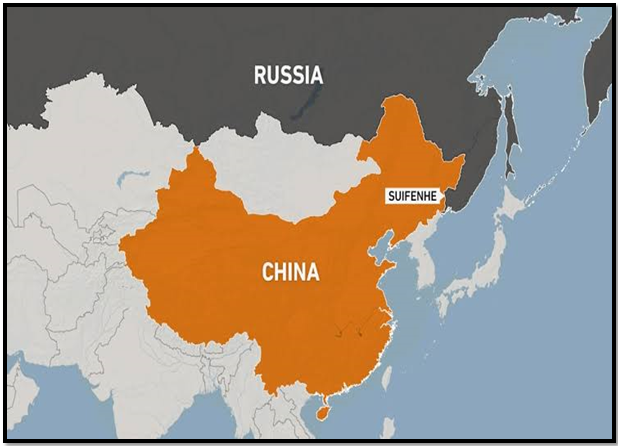A NO-LIMIT BROMANCE THAT IS NOT JUST A BILATERAL MATTER
Syllabus:
GS 2:
- India and its Neighbourhood- Relations.
- Effect of Policies and Politics of Developed and Developing Countries on India’s interests, Indian Diaspora.
Why in the News?
The recent summit between Russian President Vladimir Putin and Chinese President Xi Jinping in Beijing has significant global implications, highlighting the deepening “no-limit” relationship between the two nations. This alliance affects global geopolitics, particularly influencing countries like India with complex ties to both Russia and China.
Source: Al Jazeera
Significance of the Putin-Xi Summit
- Frequent Meetings: Vladimir Putin and Xi Jinping have met over 40 times in the past 11 years, highlighting a deepening relationship.
- Historical Milestone: The recent summit in Beijing marks the 75th anniversary of diplomatic relations between Russia and China, underlining its importance.
- Geostrategic Implications: The “no-limit” bromance between the two leaders has global ramifications, affecting nations beyond their borders.
- Impact on India: India, with its significant relationships with both Russia and China, is particularly impacted by the outcomes of this summit.
- Global Attention: The meeting draws international focus due to the combined geopolitical and economic weight of Russia and China.
Phases of Russia-China Ties
- 19th Century Expansion: Czarist Russia capitalized on a weakened China to expand its territory to the Pacific.
- Comintern Brotherhood: Following the establishment of the PRC in 1949, a decade of ideological camaraderie ensued.
- Geopolitical Rift: The 1962 Sino-Indian War and the 1969 Ussuri River border clashes highlighted the ideological and geopolitical differences between Russia and China.
- U.S.-China Rapprochement: Nixon’s 1972 visit to Beijing marked a shift, with China moving closer to the West and distancing from Russia.
- Recent Realignment: Since 2012, growing U.S.-China tensions have driven Beijing and Moscow closer, culminating in the declaration of “No Limits” in their relationship in 2022.
Current Dynamics in Russia-China Relations
- Economic Ties: Trade between Russia and China reached $240 billion in 2023, with Russia heavily reliant on China for energy exports.
- Sanctions and Dependence: Western sanctions on Russia have increased its economic dependence on China, especially for critical inputs and energy trade.
- Military and Technological Exchange: Despite a lack of public detail, there is likely increased cooperation in dual-use materials and critical technologies.
- Strategic Bargaining: China may leverage Russia’s economic dependence for better terms on raw materials and technological access.
- Regional Dominance: China seeks greater influence in Central Asia, potentially exploiting Russia’s current geopolitical vulnerabilities.
Joint Statement and Its Implications
- Omission of Bilateral Issues: The 7,000-word Joint Statement was silent on specific economic, financial, and military ties, potentially to avoid Western sanctions.
- Anti-U.S. Rhetoric: The statement focused on condemning U.S. policies, highlighting a strategic alignment against American influence.
- Strategic Cooperation: The summit may lead to intensified bilateral cooperation, particularly in areas supporting Russia’s Ukraine campaign.
- Geopolitical Bargaining: China is likely to extract concessions from Russia, including better terms for natural resources and technological collaboration.
- Long-Term Fallout: The strategic alignment could solidify a new Cold War-like polarization, challenging the existing U.S.-dominated global order.
Potential Impacts on India
- Defence Dependence: India’s reliance on Russian defence supplies is a concern, especially given Russia’s growing vulnerability to Chinese influence.
- Strategic Calculations: India needs to reassess its strategic position, balancing its relationships with Russia and China against the backdrop of this alliance.
- Economic Engagements: India must navigate its trade relationships, considering that China’s trade with the U.S. far exceeds its trade with Russia.
- Global Standing: India should aim for a higher profile within the current global order, leveraging its economic and strategic potential.
- Learning from History: India must avoid past mistakes of overly ideological stances, instead focusing on pragmatic, realpolitik-driven policies to safeguard its interests.
Overview of India-Russia Bilateral Relations
Different Areas of Cooperation in India-Russia Bilateral Relations Political Relations
Trade and Economic Relations
Defence and Security Cooperation
Science and Technology Cooperation
Education:
Cultural Cooperation
|
Strategic Recommendations for India
- Reassess Strategic Alliances: India should continuously evaluate its strategic relationships with both Russia and China, ensuring its national interests are safeguarded amidst evolving global dynamics.
- Diversify Defense Supplies: Reducing dependency on Russian defense imports by diversifying suppliers will enhance India’s military resilience and reduce vulnerability to geopolitical shifts.
- Enhance Economic Partnerships: Strengthening economic ties with multiple global partners, including the U.S. and the European Union, will mitigate risks from over-reliance on any single nation.
- Promote Technological Independence: Investing in domestic research and development will reduce reliance on foreign technology, particularly in critical sectors like defense, energy, and telecommunications.
- Strengthen Regional Diplomacy: Bolstering ties with neighboring countries and regional organizations like ASEAN will enhance India’s strategic influence in Asia and counterbalance China’s dominance.
- Engage in Multilateral Forums: Active participation in multilateral platforms such as BRICS, the Shanghai Cooperation Organisation, and the Quad will enhance India’s global standing and influence.
- Leverage Strategic Autonomy: India should utilize its strategic autonomy to navigate complex international relationships, maintaining a balanced and independent foreign policy.
- Focus on Domestic Strengthening: Prioritizing economic growth, technological advancement, and social stability at home will bolster India’s overall global competitiveness and strategic leverage.
Source:The Hindu
Mains Practice Question:
Discuss the implications of the deepening Russia-China relationship on India’s strategic and economic interests. How should India navigate these changing dynamics to protect its national interests?
Associated Article:
https://universalinstitutions.com/putin-to-visit-xi-in-may-in-ist-overseas-trip-after-re-election/




